- S.D. Eibar ready for maiden La Liga outing
- SD Eibar stengthen ahead of debut La Liga season
- Can ‘Super Mario’ live up to expectations in Madrid?
- MAN IN THE GROUND – Brentford 0 – 4 Osasuna
- Historic Basque derby welcomes S.D. Eibar to La Liga
- Munich to Madrid, via Brazil – Tony Kroos
- Rakitic in Spanish Switch
- Can Spain find redemption in Rio?
- Viva Espana! A season of redemption for Spanish football
- From the old to the new: who can fill the void in years to come for La Roja?
Spotlight Season: Super Depor lead the way – 1999-2000
- Updated: 17 April, 2012
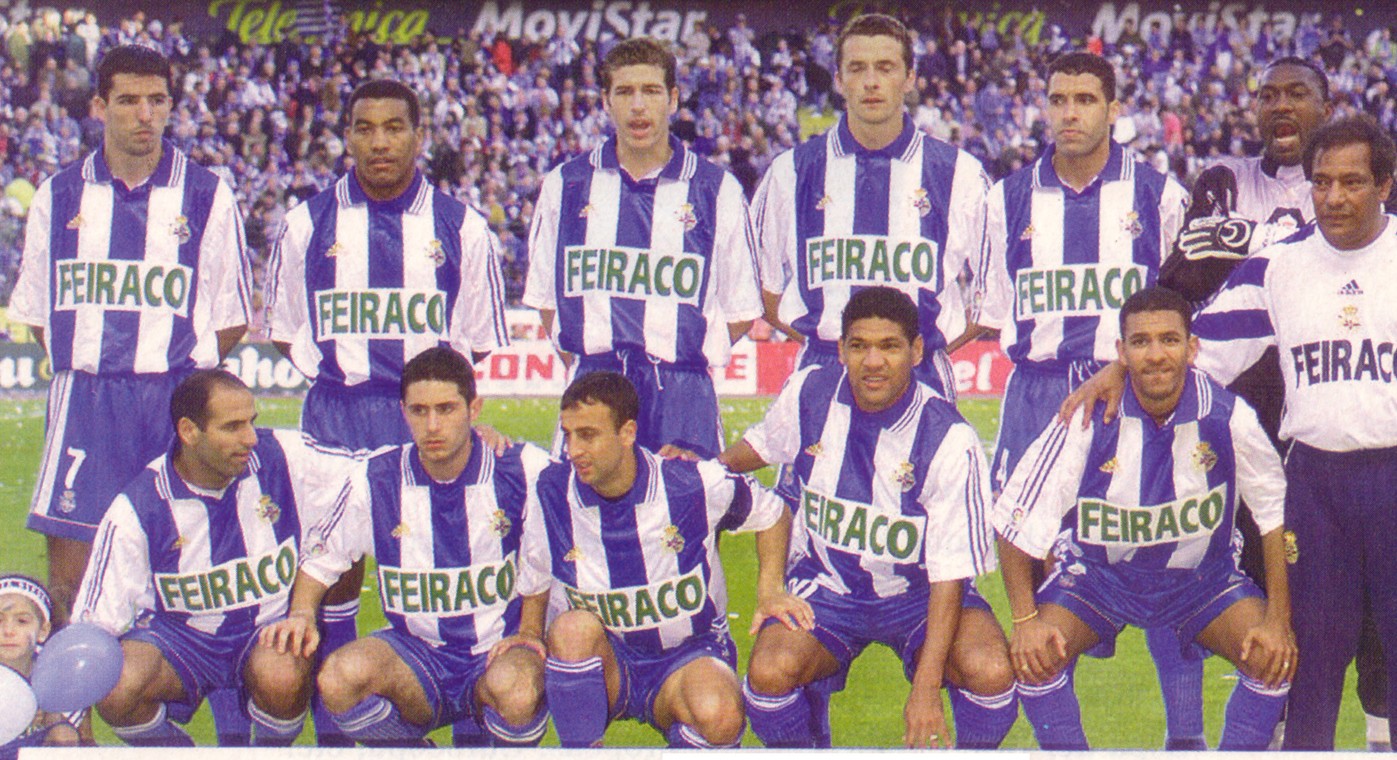
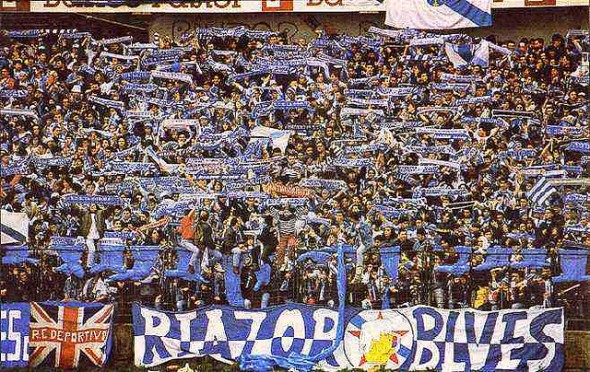
Background
Such is the domination of the big two in Spanish Football, any glimpse of a realistic alternative or threat to the duopoly is often over-egged by the sporting media. Regrettably, true pretenders to Real Madrid’s & Barcelona’s crown are few and far between, however at the turn of the last millennium a credible force was emerging in Galicia. Deportivo La Coruña had for a number of seasons, been viewed as the nearly man of Spanish football. A couple of runners-up spots and a Copa del Rey won in unusual circumstances was all the club had to show for its troubles. Many observers thought the club had shot its bolt, but the appointment in 1998 of Javier Irureta, saw Depor challenge at the top once again.
The story of the campaign
Barcelona, powered by the goals of Rivaldo, had won the previous two championships with comparative ease and unsurprisingly, was the pre-season favourite to make it three titles in a row. Barça made a steady start to the season, losing just one of its first nine matches. They shared top-spot in the first couple of months of the season with Rayo Vallecano, who helped by a favourable fixture list, featured in the top three until the end of November.
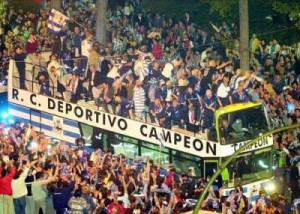 Barça’s loss at the Riazor in week 10 saw them drop from first spot and never return. Real Madrid endured a wretched first-half to the season, a start which cost manager John Toshack his job in November. His replacement, Vicente Del Bosque didn’t have it all his own way, losing two of his first three matches in charge, including a 1-5 reverse at home to Real Zaragoza.
Barça’s loss at the Riazor in week 10 saw them drop from first spot and never return. Real Madrid endured a wretched first-half to the season, a start which cost manager John Toshack his job in November. His replacement, Vicente Del Bosque didn’t have it all his own way, losing two of his first three matches in charge, including a 1-5 reverse at home to Real Zaragoza.
Depor on the other hand, built on a sound start and seven consecutive victories from the end of October to Christmas put the club in the box seat with an eight point lead. Depor couldn’t repeat its form in the second half of the season, losing on seven occasions, but such was the patchy form of their closest rivals, their points advantage never came under serious threat. Depor’s first league title was secured with a scoreless draw in the penultimate fixture at Santander.
Relegation battle
As Deportivo’s progress to a first league title became inevitable, focus turned to the bottom of the league, which had a very unfamiliar look to it. Sevilla and Atlético Madrid had struggled all season, with the former recording just five wins all season and the latter failing to win any of its last 16 matches. It was the loss of form of Real Betis that was most dramatic however.
Betis had been as high as sixth in week 12, but a complete loss of form in the second half of the season, saw the club gradually sucked into the relegation zone. Hopes of avoiding the drop were raised in week 36 when a 3-0 victory at Real Valladolid, brought them within touching distance of Real Oviedo and Numancia. However, a 0-2 defeat at home to Real Madrid a week later, saw Betis join Atlético and the cross-city rivals Sevilla in La Segunda.
Deportiva La Coruña eleven defeats during the season, are the most losses suffered by a championship winning side in La Liga history. Real Mallorca played their first official match at their new Son Moix stadium, losing 1-2 to Real Madrid on the opening day of the season.
Despite seeing his side relegated, Jimmy Floyd Hasselbank finished second in the race for the Pichichi, scoring 24 of Atlético’s 48 goals.
For the record
Despite relegation, Atlético Madrid recorded the biggest win in the league, beating Real Oviedo 5-0. Barcelona was the league’s top scorers with 70 goals, whilst not surprisingly, bottom club Sevilla conceded the most goals with 67 entering their net. A total of 999 goals were scored at an average of 2.63 per game. The average attendance in the top flight over the course of the season was 26,984, with Barcelona topping this league, averaging 65,526 for its 19 home matches.
Pichichi
Journeyman striker Salva Ballesta joined Racing Santander from Sevilla in 1998. His total of 27 goals in the 1999-00 season included 12 penalties and earned him the Trofeo Pichichi. In the summer of 2000, Salva made the surprising decision to join relegated Atlético Madrid and topped the scoring charts in La Segunda in 2000-01, but missed out on promotion. A move to Valencia in 2001 saw Salva play regularly in the championship winning side, but appearances for Los Ches became less frequent and a series of lone moves rarely brought the best out of the striker. Salva ended his career at Albacete Balompie in 2010 and is now youth team coach at Malaga.
Argentine goalkeeper Martín Herrera joined Deportivo Alavés from Ferro Carril Oeste and won the Trofeo Zamora in his first season in La Liga, conceding only 37 goals in 38 matches. Herrara played a total of 94 league matches for Alavés, as well as many cup appearances, including the 2001 UEFA Cup Final against Liverpool. After a brief spell at Fulham, Herrera returned to Argentina where he won the Apertura championship in 2006.
The clubs today
Deportivo La Coruña sit atop of La Segunda, hoping to make a quick return to the top tier following last season’s relegation. They are joined in the second division by Real Valladolid, Numancia and Galician rivals, Celta Vigo.
Real Oviedo and Deportivo Alavés have dropped the furthest and now play their football in Segunda B. Fourteen of the 1999-00 participants can be found in this season’s La Primera.
Follow @icentrocampista
6 Comments
You must be logged in to post a comment Login

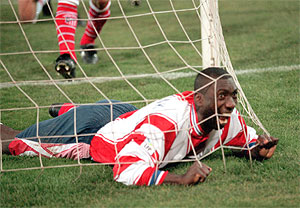
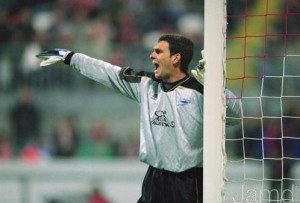
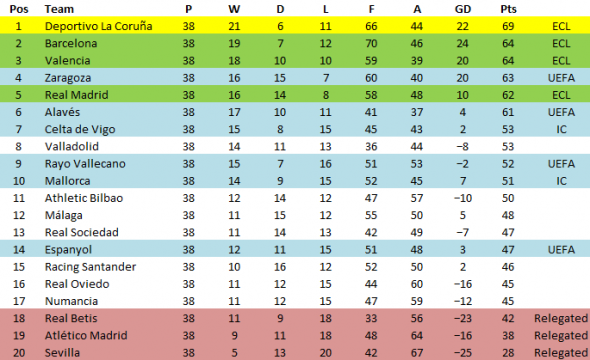

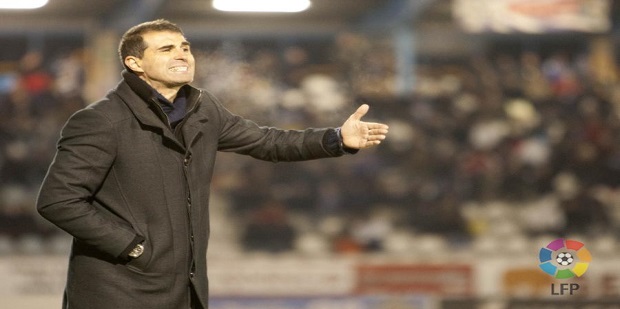
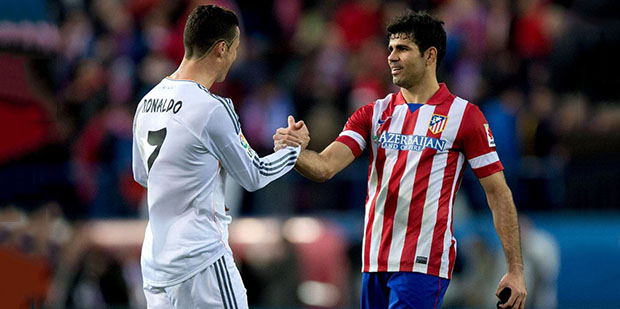


Pingback: Spotlight Season: Super Depor lead the way – 1999-2000 – El Centrocampista